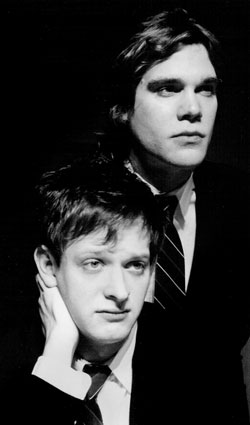By Davida Singer
Although “New Boy”, the smash comedy based on William Sutcliffe’s best-seller, has traveled a very long way before reaching our shores—from England to The Lion Theatre on 42nd Street—it touches on issues close to the heart of many Chelsea and Village residents.
According to director/adapter Russell Labey, it’s a mistake to call “New Boy” a gay play, but it deals with “the gray area of sexuality” and really strikes a chord “for anyone who’s had an intense friendship at seventeen or eighteen.”
Labey, who also wrote and directed “Whistle Down the Wind” and “The Go Between” in London, sat down to discuss the background of his new play, last week, just before opening night.
How did you come to adapt Sutcliffe’s novel into a play?
It was his first book, and he’s since become quite famous. I actually picked it up for a train journey. It made me laugh out loud, so I thought there was really a play here. Why the book struck me was that it was so immediately engaging. And the subject was so relevant if you’ve had that kind of friendship. Whilst it lasts, [the friendship] burns with an intense flame. Sutcliffe did much of the work for me in terms of dialogue. Most of my job was editing and structure… making it dramatic. The challenge was getting the play produced.
When did you ultimately get “New Boy” in front of an audience?
We started at the Edinburgh Festival in 2000, where it kind of took off. But this script sat on the shelf a while, because it requires an extraordinary central character who’s on stage all the time. It needed someone with special skills. One night I hooked up with Neil Henry—a brilliant, young comic actor I’d worked with before. He loved the script and I thought he could make it work. From Edinburgh, we took it on a national tour in England and it also played in London.
What should newcomers to Sutcliffe’s story know about the plot?
Mark is a 12th grader in a North London school. He’s an incredibly clever boy with low self-esteem regarding his looks, and a fascination with gynecology but zero experience. Along comes a handsome new boy and they form an unlikely friendship. Mark thinks knowing Barry can get him girlfriends, but he’s also brave enough to admit there’s more attraction here. He spends a year trying to figure out his hormones and what’s going on.
“New Boy” is a comedy because Mark is brutally honest about what’s happening in his head, even if it’s vulgar or confused. But the show is also touching because of the friendship and conflicts that arise when girls come along. It also covers cross-generational sex when Barry gets involved with a 45 year-old French teacher. It says a lot that people identify with, but can’t always voice in public.
How did you get “New Boy” to New York?
It was spotted by producer Val Sherman in London, and here we are. Part of the reason I brought the show here was that at Edinburgh, early on, we had a coach-load of tourists from Ohio—senior citizens. I was petrified because of the language in the play, but they loved it. We’ve brought a new design. It’s set in the 1980s with an 80s sound track for color, but this is really an actor-driven piece. It’s great doing this with American actors and Neil, but I didn’t want to re-set it in America. I thought that would be insulting to audiences here, and part of its charm and fun is where it’s set. It is naughty at times and still retains that English quality with words like snogging.
And what better place than New York for a play about how we’re all different, but all the same in so many ways.
Snogging? That’s English for necking.



































